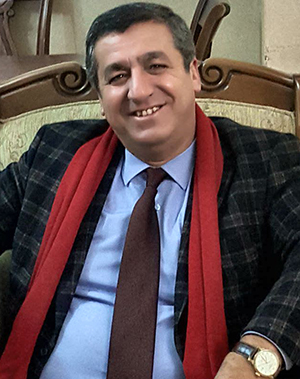
Although pluralism and peace seem to be two different concepts, they complement one another in a social life. Pluralism enlarges and strengthens the motives of love, which is the basic motive of life, and peace enlarges and strengthens the spirit of identification and compassion that come out of these motives. One cannot live without the other one. Peace gains vitality and finds meanings in pluralism, and pluralism gains vitality and finds meaning in peace.
Peace is the natural harmony of human. Pluralism is the source of human life. This source is the Lord himself. He manifests with His love within us. The essence of human life and the greatest law that governs this life is the law of love. This law provides peace to humanity and societies through the horizontal and vertical interactions (God and human) and reinforces the pluralism. It gives the freedom. According to this law, as spiritual maturity increases, the level of peace and freedom increases. The more human serves the peace, the more favor he does, the more he becomes free. He will be saved from the destruction and harm of uniqueness and uniformity that are against the Lord’s rules and the essence of the universe. Peace is a dynamic of development, the soul of society. Pluralism is the horizon of society. The soul cannot live without horizon.
Pluralism is a manifestation of variety and diversity in society. It is a fundamental truth that is founded in the essence of life. It is the necessity of the Lord’s plan who wants us to be in need of one another. Pluralism should encourage the social peace and glorify the human honor. Peace requires respect for human. It requires seeing another person as another self and the acceptance of fundamental rights arising from the dignity that is inherent in that person.
Government agencies, political parties and non-governmental organizations, as well as different organs of the same organism, are there for service and solidarity. And humanity is like a big family. Different organs of this organism should continuously honor each other with an understanding of interdependence. Although there are different views, different perceptions and different lifestyles, the social level will rise if the factors that set the social peace in motion are in accord with the Lord’s truths. Because peace is not only about thinking, saying and doing the right things. It depends on the fact that the human actions are completely in accord with absolute truths. It requires a mental-spiritual formation.
The greatest power God has given us to make peace is to change and improve our thoughts. Peace is dispersed by making changes in established thought and perceptions; it develops by becoming something new, rather than doing something new.
Since the peace is derived from humanity, the stiffening of peace is based on the intellectual and spiritual assimilation of the subject of “human and morality.” Peace recognizes moral values as the fundamental ground of living in a safe and stable society. It is grounded on creating and sustaining. Legitimate needs and collective efficacies necessitate being in constructive and transformative relations for collective mind, collective conscience.
In order to strengthen the meanings that are intrinsic to peace, the world of belief, the world of meaning and the world of sense of human must grow and develop. Thoughts should meet more in the “Love of God and Man”. Every person should see his fellow as another himself without any distinction. He should consider all the necessary opportunities for his fellow to live with dignity. Seeing someone else as himself, seeing someone else as close to himself, serving him actively becomes more important when that person is in trouble in any kind of area.
Peace in terms of pluralist understanding depends on paying regard to the public interest, on creating and implementing the conditions that help people to get what they deserve. This happens only when human dignity is respected within the measures of equity. Respect for human beings entails rights that come from the honor of being a great creature. These rights exist before society and must be embraced by it. These rights constitute the basis of the moral legitimacy of every authority. A society that sets at naught or does not recognize these rights in its positive legislation cannot establish a peace in itself. It will not be able to enhance pluralism.
While trying to protect peace and our pluralist structure without compromising on our belief-related and cultural values, the main issue is to bring together “compassion and conscience.” And that they feed and watch each other.
Selfishly self-righteous attitudes, conditionings, fears and prejudices prevent the formation of a society based on true peace and pluralism. No legislation can destroy these behaviors on its own. Such attitudes are eliminated with an approach that sees human being as ourselves, regardless of their belief, culture, ethnicity.
Malfono Yusuf Beğtaş
You can also send us an email to karyohliso@gmail.com
Leave a Comment